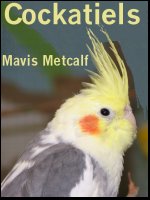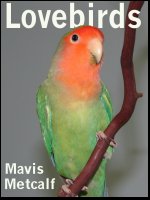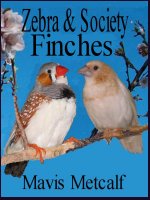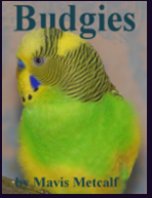Moving With Pet Birds

Your birds are going to know that something is going on and will feel the stress that you are going through while planning and packing. Before the move, you must spend time explaining what is about to happen. Even though they may not understand the words you are saying, they will understand that something is happening & will be somewhat prepared. Try to keep things as calm as possible for them by packing up & emptying one room early. The birds could then be moved into this room while the rest of the packing is going on out of their sight.
Some birds are more sensitive to stress than other birds are. You know your own birds better than anyone else does. Some birds get car sick, but most enjoy riding in a car.
Short moves within your community are often made using a small truck and/or several personal vehicles belonging to friends who are helping. Sometimes more than one trip will be made with this type of move.
Your birds should be away from all the action by keeping them in a quiet room while everyone is coming & going. They should be the last ones out of the house on either the first trip (if you will be staying at the new home while others go back for the rest) or the last trip. If possible, your birds should be in your private vehicle in travel cages. In the new home, your birds should be the first into the house and be put in a quiet room out of the way, until everything else has been unpacked & placed in its spot. Music could be playing in the birds’ room to help mask the sounds going on in the rest of the house.
If the new home is several hours away, you will have a large enough truck to carry all your belongs in one trip. You will also have your own private vehicle, and again, your birds should be the last to leave the house and the first to enter the new home and both times be in an out of the way room while all the activity is going on.
You will have to stop for meals on a trip of this length and care must be taken if leaving the birds alone in a car for even a few minutes. If it is summer & hot, the temperature of the car can increase dramatically when parked, even in the shade. If it is winter & cold, the temperature of the car will drop just as dramatically when parked. In both instances, it would be better to make sure you have a second set of car keys, so the vehicle can be left locked & running with either the air condition or heat turned on to ensure an even temperature. Keep the stops as short and as infrequent as possible. In the event that either the heater or the air conditioner malfunctions, you could be facing a serious situation.
If there is a 2nd person in the vehicle, one person can remain in the vehicle while the other leaves. Even so, stops should be kept to a minimum. You could bring foods to make a quick lunch or pick up food at a drive thru restaurant & stop for picnics along the way. This will give you a chance to provide some water & fresh foods to your birds.
Less frequent, but more stressful moves are those that are may take you a few or several provinces or states away from your present home. The above information applies to this move plus several additional plans.
More advance planning is required for a move such as this. Some states have laws that prohibit certain birds from being in that state. If you are crossing through one of these states, you may have to consider several additional hours driving to go around rather than through. If you are absolutely sure that you can get through the state without stopping for gas, meals or the night you may decide to take the shorter route through, but at the very least, you must know which states have which laws. If the state you are moving to prohibits a bird that you own, you may have to find another home for that bird before your move.
You must plan ahead to ensure that any motels you stop at will allow you to bring your birds in for the night. There may be an extra surcharge, but since you will know this in advance, you will be prepared. You should have a large sheet or tarp with you to cover the area where the birds’ cages will be in the hotel. This will limit the mess while you clean cages & put in fresh food and water. In the morning the tarp is rolled up, shook outside and put into the vehicle for the next night’s stop.
You must have a good supply of your birds’ food and water with you so that no changes occur during the move. Your pellet and seed mixtures might be difficult to obtain as soon as you arrive at your new home so be sure to bring enough to last at least a few weeks. The water will be different so make sure you bring enough to make a gradual change once you arrive. You can pick up fresh fruit & vegetables as you go, but could bring a good supply with you kept in a cooler to last a few days which will limit the time you must spend away from your vehicle. Water spills while traveling, so your birds’ main source of liquid should come from fruits & vegetables while driving. A drink of water can be given at stops.
Your birds should all have a health certificate from your veterinarian before the move. This is more for your benefit than a requirement, but the certificate will identify the bird as well as give you something to show to your new veterinarian when you arrive. You should also have a means of identifying each of your birds with a band (you have to know the number) and/or a microchip.
Once you are in your new home & your birds have been returned to their regular cages, try to get things set up the same as they were before the move so that something is familiar to them. Once they show that they have accepted the move without problem, you may start to make changes in their cage again.
If you have any questions or comments, please feel free to drop by the Bird Forum anytime (see the most recent topics below.
After many years of pet bird ownership, I have decided to write e-books about the care of some of these wonderful birds.




This site needs an editor - click to learn more!
You Should Also Read:
Traveling With Your Bird
Emergency Travel Kit for Your Bird
Bird Site Map
Related Articles
Editor's Picks Articles
Top Ten Articles
Previous Features
Site Map
Content copyright © 2023 by Mavis Metcalf. All rights reserved.
This content was written by Mavis Metcalf. If you wish to use this content in any manner, you need written permission. Contact
BellaOnline Administration
for details.


